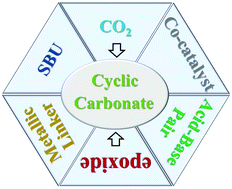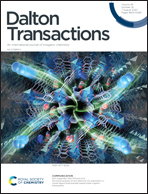Metal–organic frameworks for the energy-related conversion of CO2 into cyclic carbonates
Abstract
Excessive emissions of carbon dioxide (CO2) in the atmosphere result in a series of energy and environmental issues all around the word. Thus, it is urgent to prepare efficient materials for the conversion of CO2 as a C1 source into energy-related chemical products. Porous metal–organic frameworks (MOFs) are a class of rapidly growing crystalline materials, which have attracted significant attention for application in the conversion of CO2 into cyclic carbonates. In this review article, the developments made in recent years with respect to the application of MOFs as heterogeneous catalysts for the energy-related conversion of CO2 into cyclic carbonates are highlighted; moreover, we have further discussed the opportunities and challenges in the use of MOFs in this field.

- This article is part of the themed collection: 2020 Frontier and Perspective articles


 Please wait while we load your content...
Please wait while we load your content...